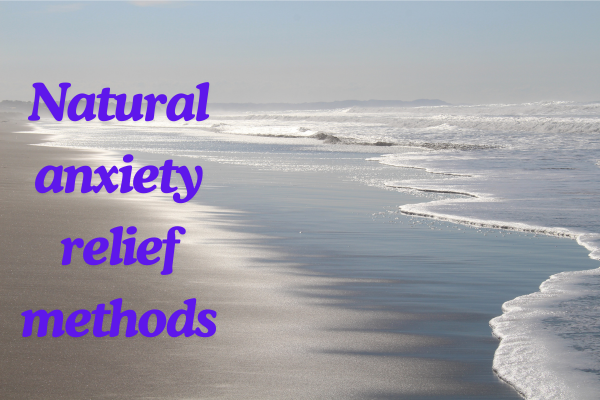Anxiety is experienced by a majority of people whether it’s the pressures of work, personal responsibilities, or global uncertainties, the feeling of being overwhelmed can creep in unexpectedly. While professional help and medication are effective for many, natural methods can also provide significant relief. If you’re seeking a more holistic approach to calming your mind and body, here are several natural anxiety relief methods to embrace a calmer, more balanced life.

Table of Contents
1. Mindfulness Meditation
Mindfulness meditation is one of the most powerful tools for reducing anxiety. The practice encourages you to focus on the present moment, helping to break the cycle of overthinking and worry. By cultivating an awareness of your thoughts, feelings, and surroundings without judgment, you can create space between yourself and your anxiety. Over time, regular meditation practice can lead to a calmer mind, more emotional balance, and reduced stress levels.
- How to Start:
- Set aside 5-10 minutes each day for meditation.
- Sit comfortably in a quiet place and start focusing on your breathing.
- Whenever your mind wanders gently bring your attention back.
- Use guided meditation apps if you’re new to the practice.
2. Exercise and Movement
Physical activity is a proven way to alleviate anxiety. When you exercise, your body releases endorphins, which are natural chemicals that boost mood and reduce stress. Exercise can also lower cortisol levels, a hormone often associated with stress. Whether it’s running, yoga, or even a short walk in nature, moving your body can significantly improve your mental state.
- Best Exercises for Anxiety Relief:
- Yoga: Combines movement, breathing, and meditation to calm both the body and mind.
- Aerobic Exercise: Activities like running, swimming, or cycling that increase heart rate and release endorphins.
- Walking: Simple, gentle, and effective—especially in nature.
3. Breathing Techniques
Shallow, rapid breathing is common when anxiety strikes, but it can exacerbate the symptoms. Deep breathing exercises help regulate the nervous system, slow the heart rate, and promote a sense of calm. The simple act of slowing down your breath can reduce panic and help regain control over your emotions.
Try This Breathing Exercise:
- Inhale quietly through your nose for a count of four.
- Count seven while holding your breath.
- Exhale completely through your mouth for a count of eight.
- Repeat the cycle four times.
4. Herbal Remedies
Herbs have been used for centuries to treat anxiety and stress. Certain plants contain natural compounds that support relaxation and mental well-being. While they aren’t a replacement for medical treatment, many people find relief using herbal supplements.
Popular Herbs for Anxiety Relief:
- Chamomile: Often consumed as tea, chamomile has calming effects that can help reduce anxiety.
- Lavender: Known for its soothing scent, lavender can be used in essential oils, teas, or baths to promote relaxation.
- Ashwagandha: An adaptogenic herb that helps balance stress hormones and reduce anxiety.
- Passionflower: A natural sedative often used for mild anxiety and insomnia.
5. Healthy Diet
What you eat affects your brain, which in turn impacts how you feel. A diet rich in whole foods, healthy fats, and nutrients supports both physical and mental health. Foods that are high in omega-3 fatty acids, magnesium, and vitamins B and D are particularly beneficial for anxiety reduction.
Foods to Incorporate:
- Create a calming bedtime routine (e.g., reading, warm baths).
- Avoid caffeine or heavy meals before bed.
- Maintain a consistent sleep schedule, even on weekends.
- Limiting screen time can play a major role for a quality sleep.
7. Social Connections
Connecting with others is vital for mental health. Isolation can increase feelings of anxiety, while meaningful relationships provide emotional support and a sense of belonging. Whether it’s talking with friends, family, or joining a support group, sharing your feelings with someone who listens can lighten your emotional load.
Ways to Build Connections:
- Schedule regular get-togethers with friends or family.
- Engage in activities or hobbies where you can meet like-minded people.
- Volunteer in your community to feel a sense of purpose and connection.
8. Creative Outlets
Engaging in creative activities can act as a form of meditation, allowing you to express emotions nonverbally. Art, music, writing, or even gardening can help channel anxious energy into something productive, giving your mind a break from worry.
Ideas to Explore:
- Try journaling to release pent-up thoughts.
- Paint or draw without judgment—focus on the process, not the outcome.
- Play a musical instrument or listen to calming music to soothe anxiety.
9. Limit Stimulants
Caffeine, nicotine, and sugar can all trigger or worsen anxiety. These stimulants increase heart rate and jitteriness, which can mimic anxiety symptoms. Reducing your intake of these substances can help create a more stable, calmer mood.
Conclusion
Natural anxiety relief methods offer a holistic approach to managing stress and achieving mental balance. You can gradually reduce anxiety and cultivate a more peaceful life by incorporating mindfulness, movement, breathing techniques, healthy nutrition, and meaningful connections into your daily routine. Remember, it’s about finding what works for you and making small, sustainable changes over time. Whether through meditation, a nature walk, or a soothing cup of chamomile tea, embracing natural methods can bring you closer to a calmer, more balanced life.

Excellent post
thank you